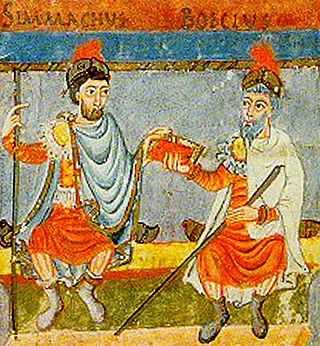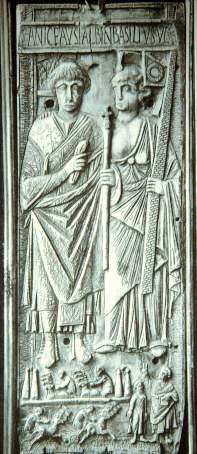Related Research Articles

Year 502 (DII) was a common year starting on Tuesday of the Julian calendar. At the time, it was known as the Year of the Consulship of Avienus and Probus. The denomination 502 for this year has been used since the early medieval period, when the Anno Domini calendar era became the prevalent method in Europe for naming years.
Pope Severinus was the bishop of Rome elected in October 638. He was caught up in a power struggle with Emperor Heraclius, who pressured him to accept Monothelitism. Severinus refused, which for over eighteen months hindered his efforts to obtain imperial recognition of his election. His pontificate was finally sanctioned on 28 May 640, but he died two months later.

Quintus Aurelius Memmius Symmachus was a 6th-century Roman aristocrat, an historian and a supporter of Nicene Christianity. He was a patron of secular learning, and became the consul for the year 485. He supported Pope Symmachus in the schism over the Popes' election, and was executed with his son-in-law Boethius after being charged with treason.
Ora maritima is a poem written by Avienius claimed to contain borrowings from the 6th-century BC Massiliote Periplus. This poeticised periplus resulted in an anachronic, non-factual account of the coastal regions of the known world. His editor André Berthelot demonstrated that Avienius' land-measurements were derived from Roman itineraries but inverted some sequences. Berthelot remarked of some names on the Hispanic coast "The omission of Emporium, contrasting strangely with the names of Tarragon and Barcelona, may characterize the method of Avienius, who searches archaic documents and mingles his searches of them with his impressions as an official of the fourth century A.D." Ora maritima was a work for the reader rather than the traveller, where the fourth century present intrudes largely in the mention of cities at the time abandoned, like the legendary Ophiussa. More recent scholars have emended the too credulous reliance on Avienius' accuracy of his editor, the historian-archaeologist Adolf Schulten. Another ancient chief text cited by Avienius is the Periplus of Himilco, the description of a Punic expedition through the coasts of western Europe which took place at the same time of the circumnavigation of Africa by Hanno.

Anicius Faustus Albinus Basilius was a high official of the Eastern Roman Empire and the last ordinary consul of Roman history, holding the office alone in 541.

The praetorian prefecture of Italy was one of four praetorian prefectures into which the Late Roman Empire was divided. It comprised the Italian peninsula, the Western Balkans, the Danubian provinces and parts of North Africa. The Prefecture's seat moved from Rome to Milan and finally, Ravenna.
Sextus Claudius Petronius Probus was a leading Roman aristocrat of the later 4th century AD, renowned for his wealth, power and social connections. The son of the consul Petronius Probinus, he married Anicia Faltonia Proba and had two sons. He had a successful political career, becoming praefectus urbanus, Proconsul of Africa, four times praetorian prefect, and consul alongside the emperor Gratian. His grandson and great-grandson went on to become emperor.

Rufius Gennadius Probus Orestes was a Roman aristocrat. He was appointed consul of the Senate for the year 530, which he held alongside Flavius Lampadius. Johannes Sundwall believed Orestes was the son of Rufius Magnus Faustus Avienus, the consul of 502, and this view has been supported by more recent writers.
The gens Anicia was a plebeian family at ancient Rome, mentioned first towards the end of the fourth century BC. The first of the Anicii to achieve prominence under the Republic was Lucius Anicius Gallus, who conducted the war against the Illyrians during the Third Macedonian War, in 168 BC.
Gennadius Avienus was an influential politician of the Western Roman Empire. He was consul in 450, alongside Valentinian III. In 452, he was an envoy to Attila; together with Pope Leo I and Trigetius he successfully negotiated a truce. He had a son and a daughter; his son would go on to be consul in 490.
Pompeius was a politician of the Eastern Roman Empire and nephew of the Emperor Anastasius I. His family gained political prominence with the accession of Anastasius. Pompeius was consul in 501, and was elevated to the patricianate, probably by Anastasius. He held military office, serving in the Iberian War. He married a woman named Anastasia, and had at least one son. In 532, Pompeius' brother Hypatius was acclaimed emperor by the rioters during the Nika riots; after the riots were put down, both Hypatius and Pompeius were executed.
Flavius Avienus was a Roman politician during the reign of Theodoric the Great. He held the consulship with Pompeius as colleague in 501.

Caecina Decius Maximus Basilius, was a Roman politician. He was the first consul appointed under Odoacer's rule (480), and afterwards was Praetorian prefect of Italy. He is best known for presiding over the papal election of Pope Felix III.
Inportunus was a Roman aristocrat who lived during the reign of Theodoric the Great. He held the consulship without colleague in 509.
Theodorus was an Italian politician during the reign of Theodoric the Great. He held the consulship with Sabinianus as his colleague in 505.
Caecina Decius Faustus Albinus was a Roman politician during the reign of Theodoric the Great. He held the consulship with Eusebius in 493. Albinus is best known for being identified with the senator whom Boethius defended from accusations of treasonous correspondence with the Eastern Roman Empire by the referandarius Cyprianus, only to have Cyprianus then accuse Boethius of the same crime.
Ennodius Messala was an Italian senator in Ostrogothic Italy. He was appointed consul for 506 with Areobindus Dagalaifus Areobindus as his colleague.
Anicius Probus Faustus Niger was a politician of the Western Roman Empire who served as consul in 490 and as praetorian prefect of Italy from 509 to 512.
The gens Rufia, occasionally spelled Ruffia, was a minor plebeian family at ancient Rome. Members of this gens are not mentioned in history until imperial times, and they achieved little prominence until the late third century, from which time the family rose in importance, gaining the consulship on a number of occasions from the time of Constantine the Great to that of Justinian, and frequently holding the post of praefectus urbi.
Avienus may refer to:
References
- ↑ Jeffrey Richards, The Popes and the Papacy in the Early Middle Ages (London:Routledge and Kegan Paul, 1979), p. 79